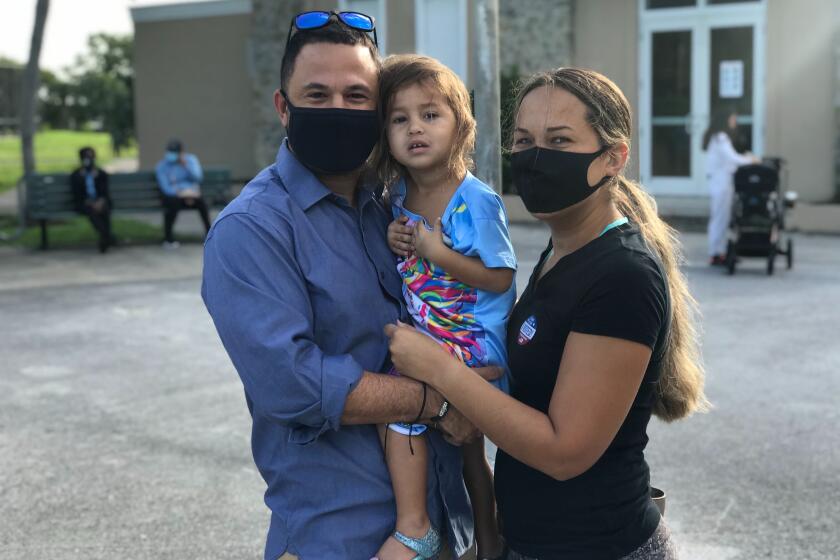In search of a little World Series luck, L.A. voters visit Dodger Stadium on election day
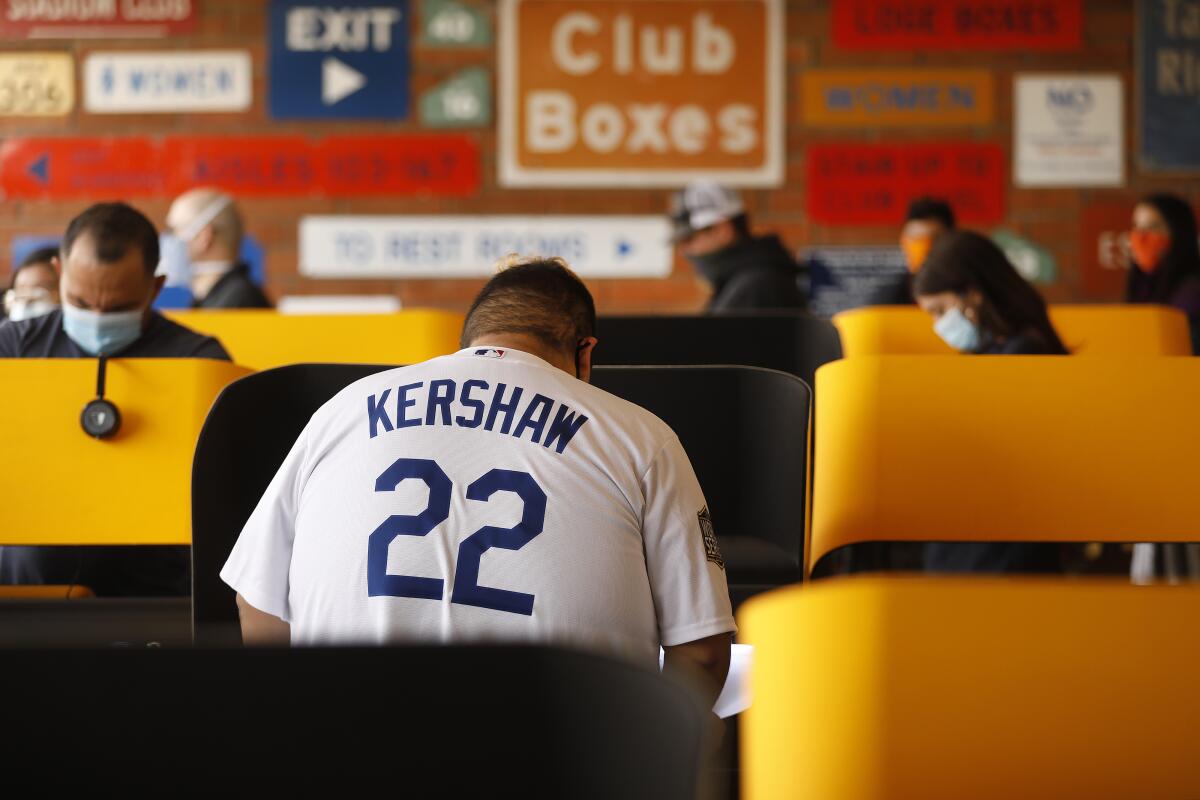
- Share via
It was so foggy early on election day when I drove to Dodger Stadium, but the sun began to break through just as I arrived, which seemed to match the hopeful mood I found in the vote center on the top deck.
People were openly expressing joy, which felt wonderful and novel in a twitchy time so heavy with anxiety, stress and dread.
Joy about exercising their rights as citizens. Joy about doing so in a place they love and are longing to celebrate in and have missed. Joy about the chance to be out in the company of others — if only briefly and masked.
Joy, too, to be away from the rage they told me they keep encountering on social media and the news, and to be a part of a harmonious diversity of Americans — of so many different ages and backgrounds.
There was no line to get in, but people kept coming and coming — many after driving long distances.
Parents brought their kids. Big families proudly performed their civic duty together.
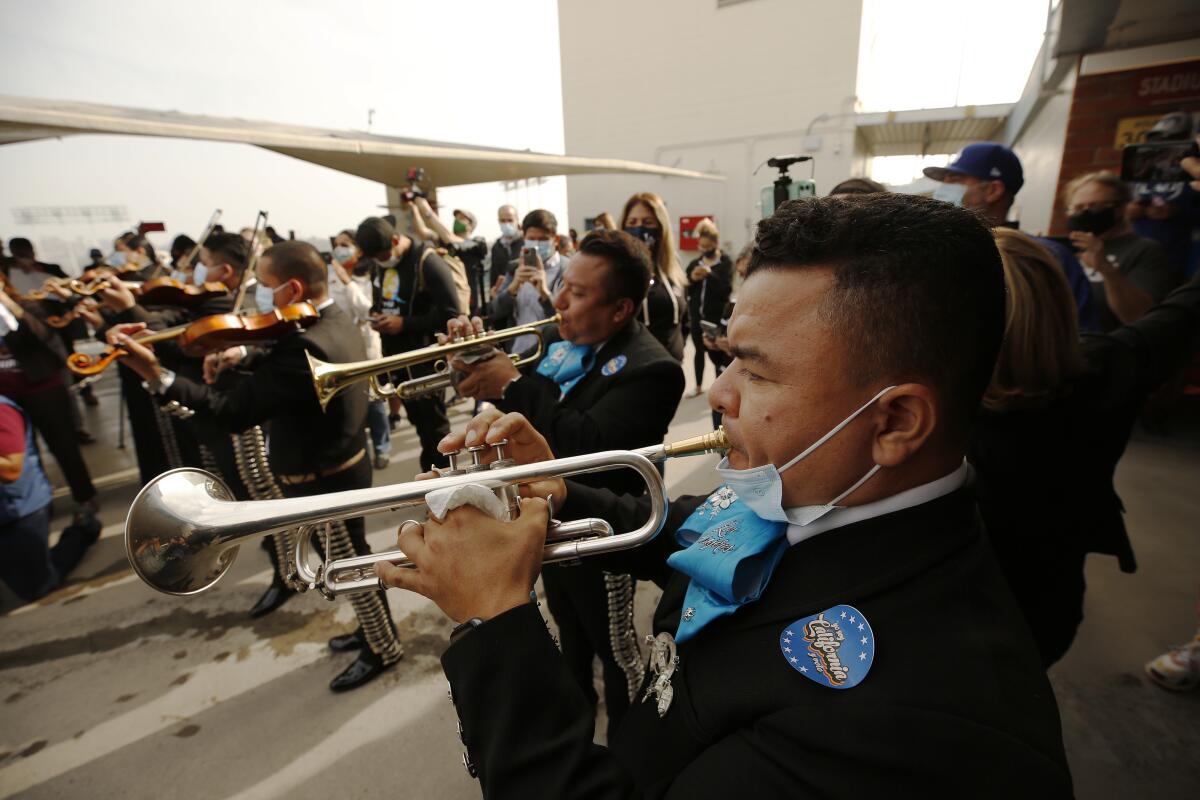
Mariachi bands played. Cheerful volunteers handed out free sandwiches and coffee and water and snacks. And huge cheers went up every time poll workers learned someone had come to vote for the first time.
“This is amazing. This is the Los Angeles that I want to represent us,” said Olivia Tai, 34, on a brief break from her stint as a Cantonese-speaking poll worker in Chinatown, as she took in the vote center and posed with the ball field in the background.
President Trump and Joe Biden battled into Wednesday morning with no clear winner, as major contests remained too close. Biden urged patience, while Trump called the election into question.
Tai wore a shirt tie-dyed blue, white and a sort of pinkish red. It had numbers on the back: “11 03 2020.” On a big label on the front printed with “WHY I AM VOTING:” Olivia had written in black marker “Because this is — for real — the most important election of our lifetime.”
An EMT who freelances for events and on sets, she told me she cares deeply about civil rights and climate change and wants a government that protects and supports people.
“I would love to be able to have a kid and actually have work policies that support that. I want to make sure that I can be taken care of as I’m aging,” she said.
But she also made clear that the election, for her, was equally about worldview, which working the polls had brought home.
She was opting for “humanism,” she told me, for a focus not on what divides us but on how most of us are more like each other than different.
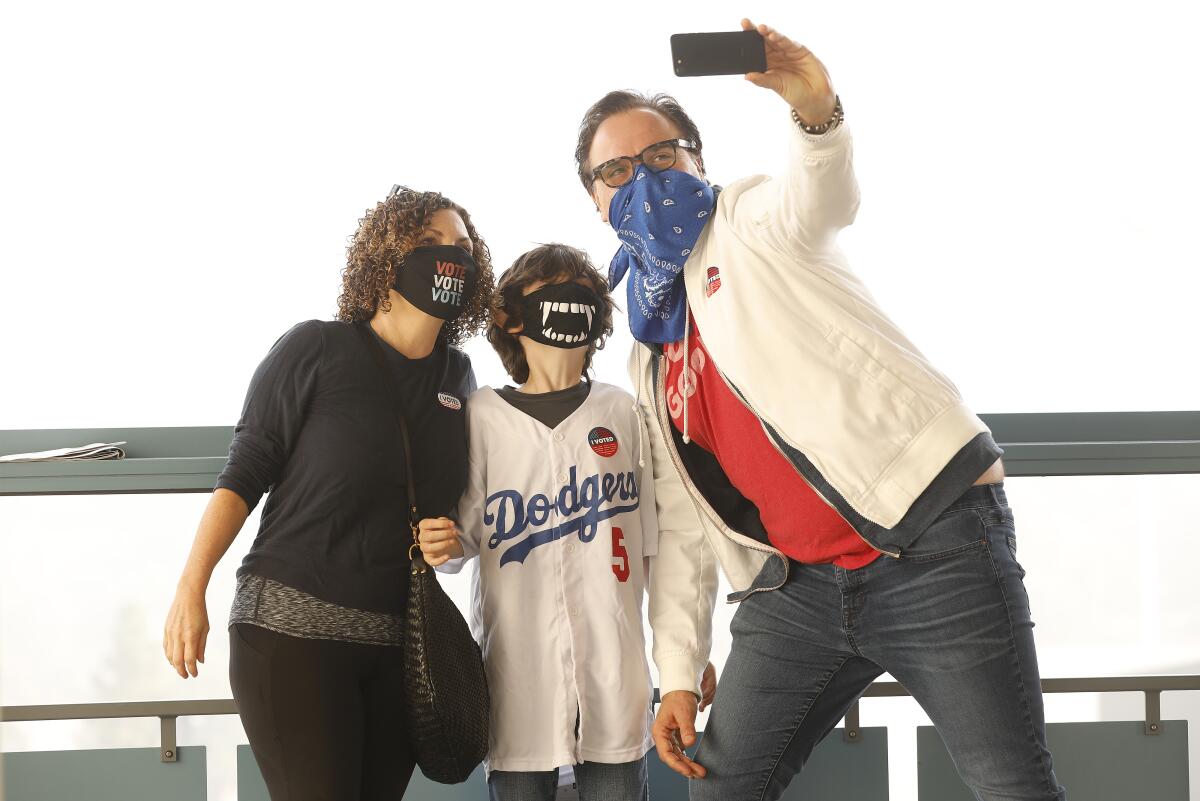
“People can be voting for things that you don’t believe in, but they’re still people. They’re still like you. You can still relate to them. You can still look them in the eyes and see them,” she told me.
First-time voter Jazzlyn Herrera, 19, a student at Rio Hondo College, said she had come out with her parents to make a similar statement in her vote for a new president.
“His words cause a lot of anger and hatred,” she said of our current leader. “We need someone more composed.”
The president’s words trigger people, she said. “They turn against each other so quickly. And then it goes to racism. And it just expands from there.”
I tried to find a supporter of the presidential status quo in my time at the stadium. I didn’t — and I know, much of L.A. doesn’t exactly lean his party’s way. But what I heard from those who criticized the president didn’t sound partisan. It was about unity and removing barriers that divided people. It sounded patriotic. It also sounded like the future, whatever happens this time around.
Nancy Moz, 28, told me she has had it hard during the pandemic. She has two jobs — working for Norms Restaurants and at a nursing home near Westwood that has lost residents and workers to COVID-19. She lives with her family in Westlake — eight people in four bedrooms. Six of her relatives have gotten the virus, though everyone has made it through.
She said she was voting for a new president “because I feel he cares a little more about the people” but is also very much voting against the current president.
“I want my voice to be heard. I believe this is a time to make change. I do believe that the United States can become united,” she told me. She said she hoped for a future of “acceptance.”
“As a lesbian Hispanic person, I want to be more accepted,” she said. “I want more acceptance for everyone, for everyday life.”
Giovanna Montgomery, 23, said she and her husband, Jamal Young, 37, drove to the stadium from Pomona, maybe hoping that a little World Series luck would rub off on their ballots.
“It’s been a very scary time. Very scary,” she said. “I just feel a lot of racism.”
She said she was hoping that her vote and others would lead “to some peace, some equality. Hopefully 2021 will bring some positivity.”
Election 2020: Our reporters, dispatched to more than a dozen cities in battleground states, are asking voters what brought them out to the polls.
Young nodded along. “I want to see people come together, how it should be,” he said. “People to treat people nice and be kind to everyone.”
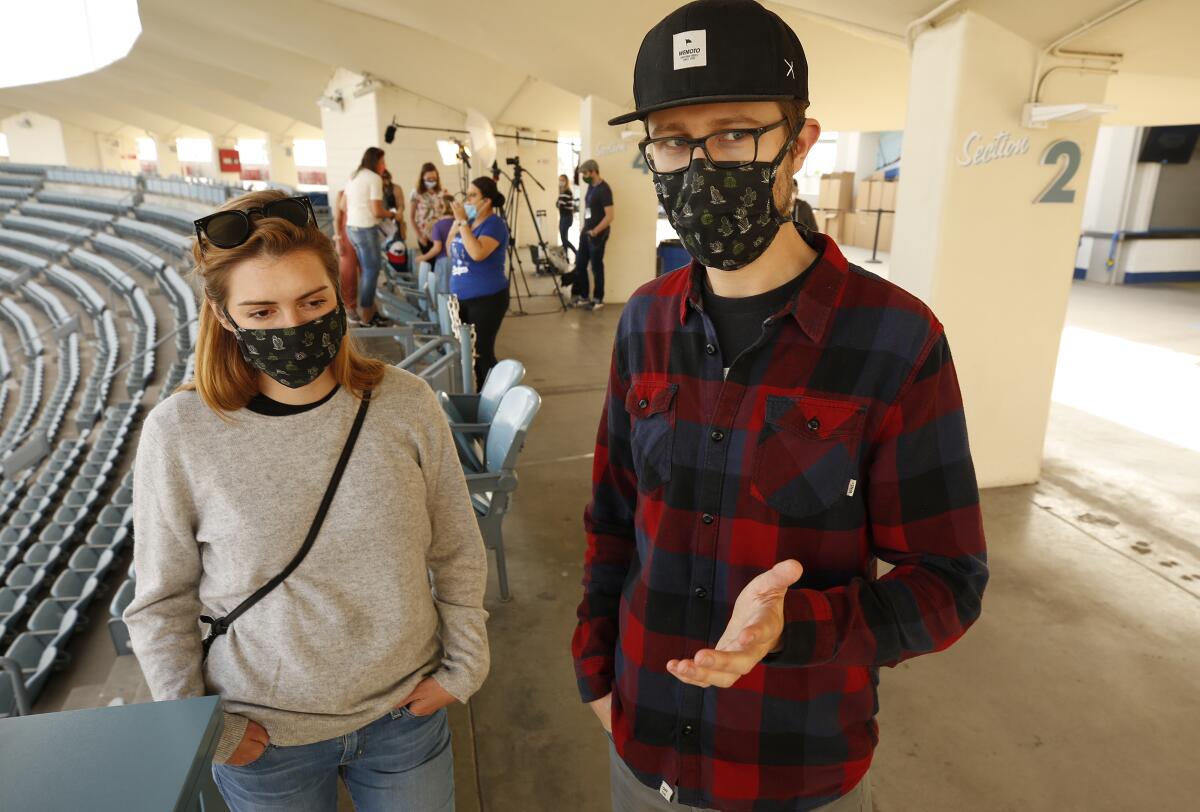
Mike and Lynn Gottschalk told me they’d given up their mid-city apartment and moved out to Big Bear after the pandemic hit, since they could now work anywhere remotely. But they’d driven back to town to make a day of voting with friends. And also to mark the moment, which they hoped would be all about change.
Lynn is from Germany and not yet able to vote here. Mike, 31, comes from Wisconsin. His grandmother, he said, still lives there and just voted for the first time at age 78. She’d always been so moderate that she found good on all sides and so never cared passionately enough about who would be the winner of an election. But the current president’s behavior changed that. She told her grandson, “We’ve got to get him out of the White House.”
He said he felt the same way, especially because of how much one man had divided the country against itself.
“I would like less polarization, more discussion,” he told me. “I feel like one of the things that’s really unfortunate is that there’s less talking and debating. And I think talking and debating is the only way you can actually come out with better ideas oftentimes.”
“Like, hear each other’s viewpoints,” his wife said.
“I would like to see more of it,” he said. “Whoever you vote for, I think talking is a really, really good thing, and I’ve seen less and less of it over the last few years.”
Just as I was leaving the stadium, I ran into Lisa Burnley, 58, who drives Metro trains for a living and had made the trip from Lynwood. She did so in memory of her late father, who took voting very seriously and had loved the Dodgers since Brooklyn. He would have loved to see the World Series victory, she said. He would have loathed our president.
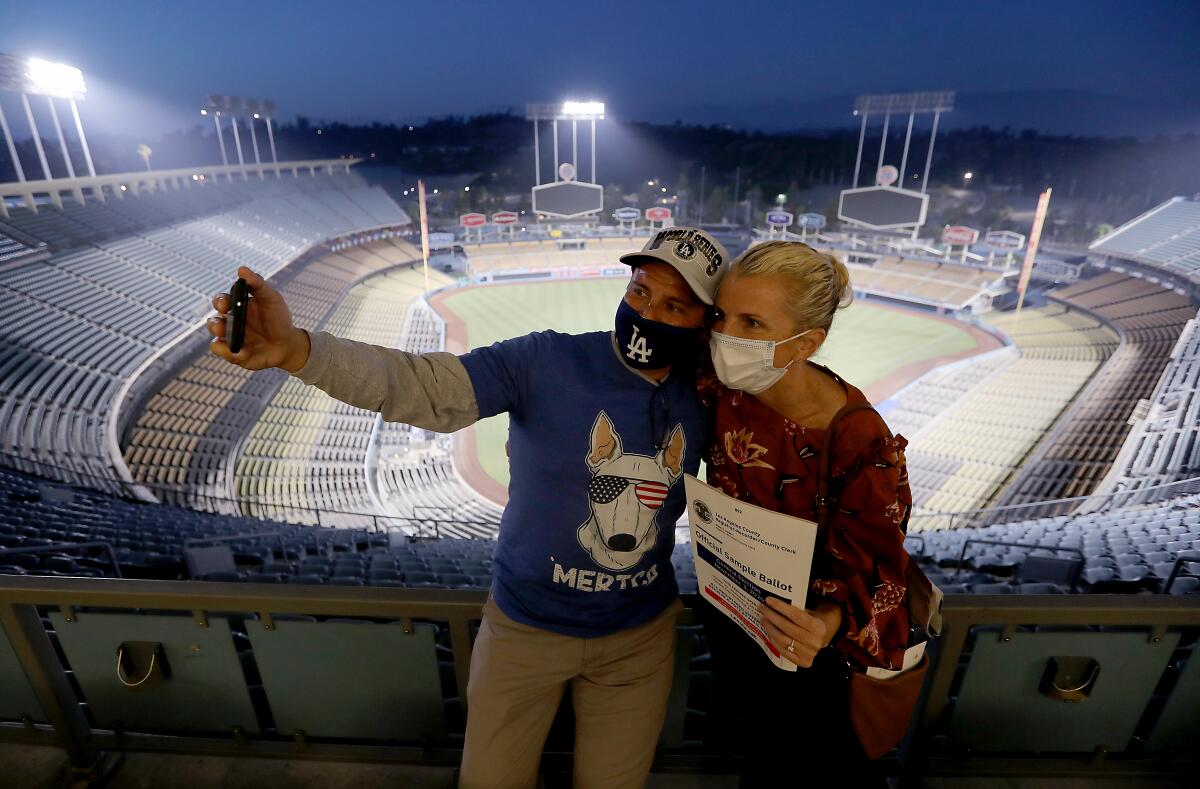
“He was such a humble man. He would have said, ‘Watch out, he’s slick.’ He wouldn’t have gone for none of the negative,” she said.
She told me she hoped the election would bring her nation “reunification and stability.”
“Just look at everything we didn’t get a chance to do this year,” Burnley said. She said she laid the blame for that “150%” at the president’s feet.
As I drove home along Sunset Boulevard, I took in this year’s world. I passed a line in front of a sidewalk COVID-19 testing site, a man unloading big sheets of plywood to board up his storefront, other shops already boarded up and blank-faced, the message “To be continued...” on a theater marquee.
And on a cement embankment, a word in silver duct tape caught the sunlight: “BREATHE.”
That summed up to me what I’d just heard from voters.
So many of us hope to move past this moment and be able to breathe freely again, in harmony, together.
More to Read
Sign up for Essential California
The most important California stories and recommendations in your inbox every morning.
You may occasionally receive promotional content from the Los Angeles Times.
